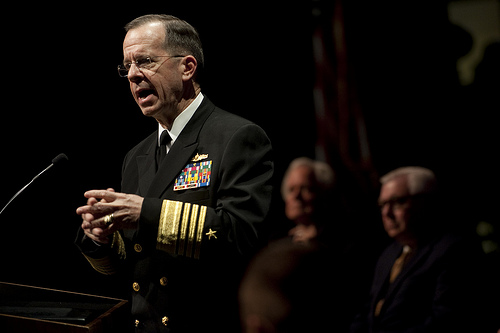
Chairman of the Joint Chiefs of Staff Admiral Mike Mullen recently gave a speech in Kansas where he outlined a vision of warfare for the current era. Reflecting on nine years of continuous warfare in Central Asia and twenty years military involvement in Iraq, he proposed three rules that challenge traditional notions of using the military. His thoughts are timely as they not only inform current operations in Iraq and Afghanistan, but also NATO’s strategic concept. While he did not quite rewrite the principles of warfare, his three rules capture how the Pentagon thinks the character of warfare is changing.
Rule #1: The military should not sit on the sidelines waiting for crises. For Admiral Mullen:
Military forces are some of the most flexible and adaptable tools to policymakers. We can, merely by our presence, help alter certain behavior. Before a shot is even fired, we can bolster a diplomatic argument, support a friend or deter an enemy. We can assist rapidly in disaster-relief efforts, as we did in the aftermath of Haiti’s earthquake. We can help gather intelligence, support reconnaissance and provide security.
And we can do so on little or no notice. That ease of use is critical for deterrence. An expeditionary force that provides immediate, tangible effects. It is also vital when innocent lives are at risk. So yes, the military may be the best and sometimes the first tool; it should never be the only tool. The tangible effects of military engagement may give policymakers a level of comfort not necessarily or wholly justified. As we have seen, the international environment is more fluid and more complex than ever before.
Rule #2: Overwhelming forces is not a virtue in counterinsurgency. For Admiral Mullen:
Force should, to the maximum extent possible, be applied in a precise and principled way. War costs the societies that engage in it a great deal; lives and resources diverted from pursuits that a more peaceful time would allow. Even now, as we are poised to reach 1,000 troop deaths in Afghanistan, were reminded of the thousands more Afghans who have been killed and the hundreds of over coalition soldiers who have likewise perished; not to mention the property and infrastructure damage that will yet take years from which to recover.
Though it can never lessen the pain of such loss, precisely applying force in a principled manner can help reduce those costs and actually improve our chances of success.
Rule #3: Civil-Military Dialogue is essential. For Admiral Mullen:
Policy and strategy should constantly struggle with one another. Some in the military no doubt would prefer political leadership that lays out a specific strategy and then gets out of the way, leaving the balance of the implementation to commanders in the field. But the experience of the last nine years tells us two things: A clear strategy for military operations is essential; and that strategy will have to change as those operations evolve.
The rules Admiral Mullen offered are not revolutionary, but they serve as a significant reminder that militaries do much more than fight wars, lethal restraint is a virtue, military objectives must be tempered by policy goals, and policy goals must be squared with ground truth. Understanding these rules are necessary as the international community considers current operations, but also preventing future crises.
Derek Reveron, an Atlantic Council contributing editor, is a professor of national security affairs at the U.S. Naval War College in Newport, Rhode Island. These views are his own. Photo credit: JCS.
Image: 4405333048_8d6078f213.jpg
